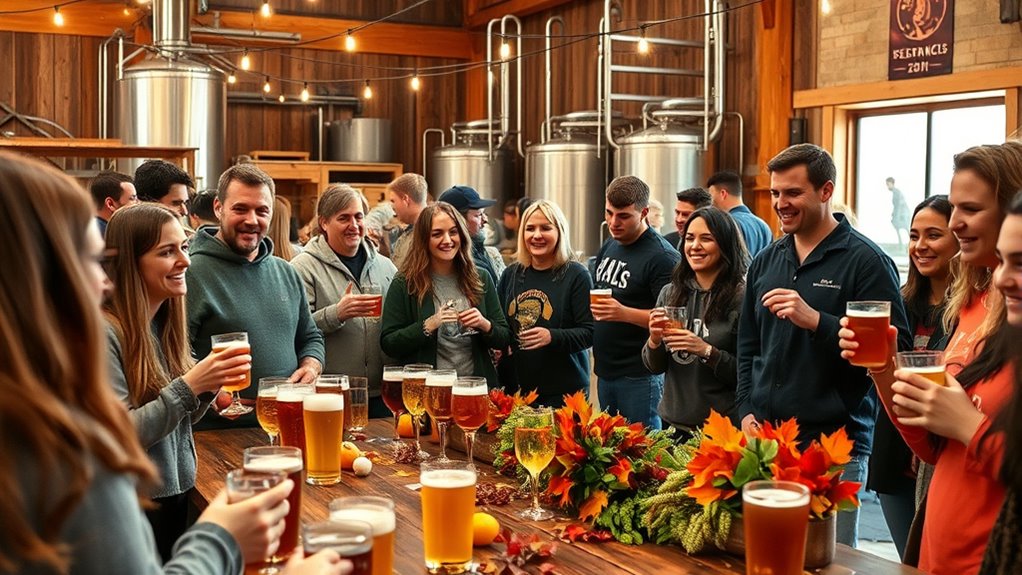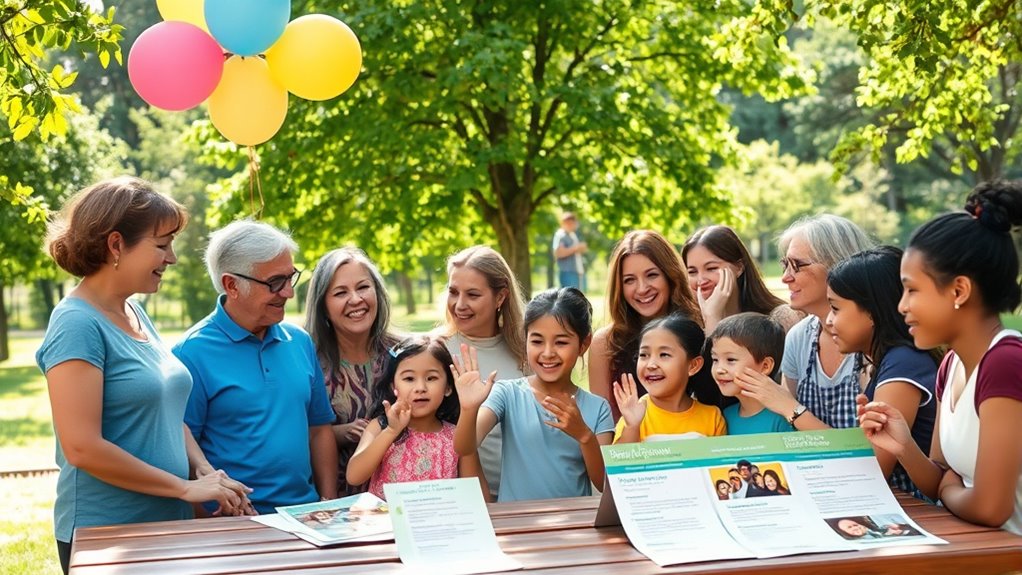To volunteer for Deaf organizations, start by researching local schools, advocacy groups, or community centers. Assess your skills, such as any sign language proficiency, and contact these groups to inquire about open opportunities. Consider your available time and how it aligns with their needs. Understanding Deaf culture and communication methods will enhance your experience. If you’re enthusiastic to explore more about volunteering roles and tips, there are plenty of opportunities to discover.
Key Takeaways
- Research local deaf organizations, schools, and advocacy groups to identify volunteer opportunities that align with your interests and skills.
- Assess your sign language proficiency and consider taking classes to enhance communication with the Deaf community.
- Contact organizations directly to inquire about available volunteer roles, application processes, and any specific requirements.
- Determine your availability and commitment level to ensure you can meet the needs of the organization you choose to support.
- Familiarize yourself with Deaf culture and etiquette to foster meaningful connections and effective communication during your volunteer experience.
Volunteer Opportunities Overview

When you volunteer for deaf organizations, you’ll find a variety of opportunities that cater to different interests and skills. From educational support to community events, there’s something for everyone. Engaging in these activities not only benefits the Deaf community but also enriches your own experiences. Many organizations, like the Texas Hearing Institute, offer year-round volunteer programs that allow you to make a significant impact while gaining valuable insights into the field. Volunteering can also lead to emotional growth as you connect with diverse individuals and learn from their experiences. Additionally, participating in these volunteer opportunities can help you develop resilience as you navigate new challenges and foster connections within the community.
Gourmet Food Truck Scene
The gourmet food truck scene offers exciting volunteer opportunities that not only satisfy your taste buds but also make a meaningful impact in the community.
By volunteering with organizations like SevaTruck, you can help serve hundreds of balanced meals at local events. Whether you’re prepping food, serving meals, or providing logistical support, there’s a role for everyone, regardless of skill level. These events effectively combat hunger and build unity among participants, while also promoting the importance of nutritional requirements for those in need. Many of these events take inspiration from family-friendly amenities found in places like water park resorts, fostering a welcoming atmosphere for all. In addition, these gatherings often include seasonal events that enhance the community experience. Engaging in these volunteer activities can also strengthen trust issues within the community, as shared goals and experiences foster closer connections among participants.
These events occur year-round, giving you plenty of chances to engage with others and make a difference. You’ll also gain valuable experience in food service and event management while meeting like-minded individuals.
Plus, the flexible scheduling allows you to fit volunteering into your life easily. Join this vibrant scene and contribute to reducing food insecurity in your area!
Urban Centers and Suburbs

When you look for volunteer opportunities in urban centers or suburbs, you’ll find a mix of vibrant organizations ready for your support. Don’t overlook underrated spots that may offer unique roles and experiences. Plus, learning basic sign language can greatly enhance your ability to connect and communicate effectively with the Deaf community. Many organizations, like HSDC, provide volunteer opportunities for practicing American Sign Language (ASL) and supporting programs for individuals with hearing and speech differences. Engaging with these organizations can also lead you to discover soulmate angel numbers that signify deep connections and love in your life. Additionally, understanding emotional support strategies can help you provide better assistance to individuals navigating communication challenges. Remember that many essential oils can improve indoor air quality, which can create a more pleasant environment for everyone involved. Also, remember to consult a veterinarian if you plan to use aromatherapy oils around pets, as some may be harmful to them.
Urban Volunteer Centers
Although many may not realize it, urban volunteer centers play an essential role in connecting individuals with opportunities to support the Deaf community. These centers, such as community organizations and Deaf schools, offer various ways for you to engage. You can assist in classrooms, provide tutoring, or help with advocacy efforts to raise awareness about Deaf rights. Many cultural associations promote Deaf culture and language, allowing you to learn while contributing. If you have specialized skills, consider offering pro bono services to enhance an organization’s capabilities. Additionally, organizations like CCDHH serve as vital resources, providing programs and support tailored to the needs of the Deaf and Hard of Hearing communities. Engaging with cultural heritage can deepen your understanding and appreciation of the diverse experiences within the Deaf community, and understanding narcissistic behavior can help you better support individuals facing emotional challenges. Furthermore, volunteering can also contribute to emotional regulation by providing a sense of purpose and community connection. Volunteering can also help raise awareness about financial considerations that impact the Deaf community, enhancing the support available to individuals in need.
Underrated Volunteer Spots
Many people overlook the variety of underrated volunteer spots available in both urban centers and suburban areas that can greatly benefit the Deaf community.
In urban settings, consider volunteering at Deaf cultural events or educational programs, where you can promote awareness and provide essential support. Advocacy groups need passionate individuals to raise awareness about the challenges faced by the Deaf community. Additionally, various roles available for community engagement and support can enhance your volunteering experience. Engaging with shared experiences from the Deaf community can help deepen your understanding and connection. Participating in these activities can also help rebuild trust within the community, fostering a sense of belonging. By volunteering, you can also discover smart shopping tips that can help you save on supplies needed for your efforts. Creating an environment that emphasizes a better senior living experience can also benefit the Deaf community by enhancing accessibility and comfort in shared spaces.
In the suburbs, local deaf schools and community centers offer opportunities for educational support and event management. You can also engage in recreational activities or fundraising events to help local organizations thrive.
No matter where you volunteer, these roles enrich both the community and your own experience, fostering meaningful connections and understanding.
Learn Basic Sign Language
Whether you’re in an urban center or a suburban area, learning basic sign language is a rewarding step toward connecting with the Deaf community. Here are some ways to get started:
- Take a Class: Urban centers like Chicago and Birmingham offer in-person ASL classes, often taught by Deaf instructors.
- Explore Online Options: If you’re in a suburb, virtual ASL classes are accessible and convenient.
- Community Engagement: Participate in local events and workshops to immerse yourself in Deaf culture and make connections. Engaging with the community also helps you understand the rich cultural heritage that is integral to the deaf community.
- Family Programs: Some classes cater to families, encouraging early exposure to ASL for children.
Craft Beer Tastings

Craft beer tastings are a fantastic way to explore iconic local flavors while supporting the deaf community. You can participate in artisanal vineyard and distillery events that often include ASL interpretation, making them accessible for everyone. Plus, culinary workshops can enhance your experience and foster connections within the community. Additionally, upcoming ASL-guided tours at local breweries provide an excellent opportunity to learn more about craft beer while enjoying a fully inclusive experience. Engaging in these activities also promotes self-care practices that can improve your overall well-being. Many events also emphasize the importance of social interaction which is crucial for community bonding and support. Furthermore, supporting local businesses contributes to the growth of the beauty industry, enhancing the overall economy and community wellness. As consumers increasingly demand sustainable fashion options, many breweries are adopting eco-friendly practices that align with this trend.
Iconic Local Flavors
Iconic local flavors come alive at craft beer tastings, where you can explore unique brews that reflect the character of the community. These events not only showcase local breweries but also foster connections among attendees. Here are four reasons to immerse yourself in craft beer tastings:
- Diverse Offerings: Sample a variety of beers, from IPAs to stouts, each with local flair.
- Community Engagement: Join a vibrant crowd, including both seasoned enthusiasts and newcomers. Craft beer market growth indicates that more people are discovering these local gems, making events even more exciting.
- Economic Boost: Support local businesses while enjoying great flavors—your participation helps the community thrive.
- Fun Atmosphere: Enjoy live music, food trucks, and interactive games, making it a memorable outing.
Artisanal Vineyards and Distilleries
As you explore artisanal vineyards and distilleries, you’ll discover a world rich in flavor and craftsmanship that enhances your tasting experience. Craft distilleries, though small in number, contribute greatly to the spirits market, with growth rates around 6% in recent years. In fact, craft distilleries accounted for 7.7% of total U.S. spirits market, highlighting their significant impact within the industry.
| Aspect | Details | Impact |
|---|---|---|
| Market Share | 7.7% of U.S. spirits market | Indicates niche appeal |
| Production Limit | 750,000 proof gallons per year | Guarantees quality over quantity |
| Leading States | CA, NY, TX | Drives regional flavors |
These unique establishments focus on local ingredients and ethical practices, giving you an authentic taste of the community. Visiting them not only supports local economies but also deepens your appreciation for the craft beverages you enjoy.
Culinary Workshops and Tastings
Culinary workshops and tastings offer a unique opportunity for individuals to explore flavors and cooking techniques while fostering connections within the Deaf community.
Here are some ways you can get involved:
- Assist in DeafPlus Adaptive Culinary Program: Help provide training that focuses on food services jobs for Deaf and Autistic individuals.
- Support Teen Cooking Classes: Engage Deaf teens in cooking activities, promoting healthy eating and socialization.
- Volunteer at Craft Beer Tastings: Facilitate inclusive experiences using ASL interpreters or visual aids to enhance communication.
- Promote Community Engagement: Foster connections among Deaf, DeafBlind, and Hard of Hearing individuals through culinary events. Additionally, participating in these workshops can help address the limited accessibility to training opportunities for DeafPlus clients.
Must-See Sights

When exploring Deaf culture, you’ll want to check out historic museums and galleries that highlight its rich history. Breathtaking national parks offer a perfect backdrop for interactive workshops, enhancing your understanding of Deaf experiences. Additionally, participating in volunteer opportunities can provide firsthand insights into the lives of deaf individuals. Don’t forget to bring visual aids to make the most of your learning journey!
Historic Museums and Galleries
Visiting historic museums and galleries can be a transformative experience, especially for those interested in Deaf culture and accessibility.
Here are some must-see sights that enhance your understanding and appreciation of Deaf heritage:
- George Eastman Museum: Features ASL tours and sign language interpretation upon request.
- Whitney Museum of American Art: Offers monthly ASL tours led by Deaf educators and ASL videos on artworks.
- Metropolitan Museum of Art: Provides in-person and online ASL tours, requiring advance reservations.
- Dyer Arts Center: Showcases work by Deaf and hard-of-hearing artists, including experimental films. The Dyer Arts Center is home to a large Deaf population and features a state-of-the-art gallery showcasing Deaf and hard of hearing artists.
These venues not only celebrate art but also promote inclusivity, ensuring everyone can engage with the rich culture of the Deaf community.
Breathtaking National Parks
Exploring breathtaking national parks offers an unforgettable way to connect with nature and experience the beauty of diverse landscapes. In 2024, parks like the Great Smoky Mountains, with over 12 million visits, showcase stunning vistas and rich wildlife. Meanwhile, iconic spots like Zion and the Grand Canyon draw millions, offering unique adventures. You’ll find that visitation trends reveal a shift, with more people exploring parks during off-peak months, reducing overcrowding. However, the National Park Service faces challenges, including staffing shortages and funding constraints, impacting your experience. Despite these issues, parks like Yellowstone and Rocky Mountain remain must-visit destinations, inviting you to witness their natural wonders. Notably, national park attendance is expected to continue growing in 2025, providing even more opportunities for adventure.
Interactive Deaf Culture Workshops
After soaking in the stunning landscapes of national parks, expanding your horizons with interactive Deaf culture workshops can be a rewarding experience.
These workshops provide a great opportunity to immerse yourself in the richness of Deaf culture and improve your communication skills. Here are four key aspects you’ll encounter:
- ASL Instruction: Learn the basics of American Sign Language to enhance your interactions.
- Deaf Culture Discussions: Engage in conversations that highlight the diverse experiences within the Deaf community.
- Experiential Activities: Participate in hands-on activities that promote understanding of Deafhood and social justice. These activities are designed to enhance customer service skills for better meeting the needs of Deaf individuals.
- Personal Bias Evaluation: Reflect on your own biases to foster a more inclusive mindset.
Attending these workshops not only broadens your knowledge but also strengthens community connections.
Bring Visual Aids
Bringing visual aids to Deaf events not only enhances communication but also enriches the overall experience. These tools foster engagement and understanding. Consider using ASL storytelling videos or sign language posters to create a vibrant atmosphere. Highlight Deaf community art and provide ASL alphabet charts for quick reference. Infographics on Deaf culture can spark meaningful conversations. Additionally, incorporating online classes can provide participants with ongoing learning opportunities to improve their ASL skills.
| Visual Aid | Purpose | Examples |
|---|---|---|
| ASL Storytelling Videos | Engage visually | Animated ASL stories |
| Sign Language Posters | Facilitate communication | Basic sign language signs |
| Deaf Community Art | Showcase Deaf perspectives | Exhibits by Deaf artists |
| ASL Alphabet Charts | Quick reference for learners | Charts in event spaces |
| Deaf Culture Infographics | Highlight key aspects of Deaf culture | Informative visual summaries |
Practical Tips

When planning your volunteer experience, it’s important to know how to get there and get around once you arrive. Understanding the unique demands of deaf education can also help you identify the best times to visit to maximize your impact and check out where to stay for convenience. Additionally, familiarizing yourself with local etiquette will help you connect better with the Deaf community and enhance your volunteering journey.
Getting There
To get started with volunteering for deaf organizations, you’ll want to first research local groups that align with your interests and skills. Here are some practical tips to help you get there:
- Identify Organizations: Look for deaf schools, advocacy groups, or cultural associations in your community.
- Assess Skills: Evaluate your skills, such as sign language proficiency or any specialized knowledge you may have. Additionally, consider how your communication strategies can enhance the volunteer experience for both you and the individuals you assist.
- Contact Groups: Reach out directly via phone or email to inquire about volunteer opportunities and the application process.
- Consider Time: Determine how much time you can commit to volunteering and guarantee it aligns with the organization’s needs.
Getting Around
Getting around the community as a volunteer for deaf organizations requires understanding the unique accessibility needs of the deaf community. Many cities offer public transportation with visual announcements, making wayfinding easier.
Consider downloading accessibility apps like Rescu for emergency services tailored to the deaf. Familiarize yourself with visual communication methods, such as sign language, to enhance interaction. Understanding Deaf culture helps build stronger connections and fosters a more inclusive environment.
Local deaf organizations provide helpful resources and guides for navigating the community. Participating in cultural events can deepen your connection with the deaf community.
When engaging, remember to use visual attention getters, like light signals or gentle taps, and consider taking deaf etiquette training to guarantee respectful communication.
These steps will help you effectively support and engage with the community.
Best Time to Visit
Volunteering with deaf organizations can be most rewarding during specific times of the year, especially when seasonal events and community gatherings take place.
Here are some ideal times to contemplate:
- Festive Season: Join events that promote community spirit and inclusivity.
- Quarterly Opportunities: Look for organizations offering regular volunteer slots every few months.
- Special Events: Participate in unique events like the Froggy Fun Run or Cocktails & Connections. These events often emphasize the writing process, which can enhance your communication skills while volunteering.
- Year-Round Programs: Engage consistently by signing up for ongoing volunteer roles.
Where to Stay
After finding the best time to volunteer with deaf organizations, securing a comfortable place to stay is next on the agenda.
You can explore several options based on your budget and preferences. Deaf community centers may offer accommodations or recommend local resources. If you’re looking for affordability, consider hostels or guesthouses, though check for accessibility features. The Deaf Community Center houses the Deaf Affordable Housing Corporation (DAHC), which provides affordable housing for low-income seniors aged 55 and older. Airbnb rentals can provide flexibility and often cater to specific needs. Remember to research local hotels that offer accessible amenities.
Planning ahead is vital, especially during peak seasons, so book your stay early. Finally, familiarize yourself with the area’s transportation options to ease your commute and enhance your overall experience while volunteering.
Local Etiquette
Understanding local etiquette in the Deaf community is essential for fostering respectful and meaningful interactions. Here are some practical tips to keep in mind:
- Attention Getters: Use light taps or gentle waves to get someone’s attention rather than calling out.
- Direct Communication: Be straightforward; the Deaf culture values honesty and clarity.
- Maintain Eye Contact: Keeping eye contact is vital during conversations, as it shows you’re engaged and respectful.
- Respect Personal Space: While it’s okay to walk through signing spaces, be mindful of people’s comfort zones.
Pro Tip
When diving into the rewarding experience of volunteering with deaf organizations, it’s important to equip yourself with practical tips that can enhance your impact.
Start by researching local organizations, schools, or advocacy groups to find the right opportunities. Assess your skills—whether it’s event planning, education, or sign language—and reach out to express your interest. Many organizations offer specialized training especially for those new to deaf culture.
Stay committed; consistency helps build trust within the community. Familiarize yourself with diverse communication methods and approach interactions with empathy and patience.
Finally, consider roles like educational support or advocacy, and don’t hesitate to seek feedback to improve your contributions. Engaging fully makes a meaningful difference!
Frequently Asked Questions
What Skills Are Helpful for Volunteering With Deaf Organizations?
To volunteer effectively with deaf organizations, you’ll find several skills helpful. Proficiency in American Sign Language (ASL) or British Sign Language (BSL) enhances communication.
If you’ve got teaching experience, you can assist with educational programs. Organizational skills are crucial for event planning and administrative tasks, while advocacy experience helps raise awareness.
Being culturally sensitive and understanding the deaf community will foster strong connections, making your contributions even more impactful.
Are There Age Requirements for Volunteering With Deaf Organizations?
Are you ready to make a difference? Most deaf organizations require volunteers to be at least 18 years old, but there’s no maximum age limit.
You might find some programs allowing younger volunteers with adult supervision, though that’s less common.
Also, age requirements can vary, so it’s best to check with specific organizations.
Ultimately, your willingness to contribute can open doors regardless of your age!
How Can I Find Local Deaf Organizations to Volunteer With?
To find local deaf organizations to volunteer with, start by searching online with keywords like “deaf organizations near me.”
Check social media platforms for community events and groups.
Visit community centers or libraries for postings about volunteer opportunities.
Explore local government websites for resources.
Don’t hesitate to ask friends or family for recommendations; word of mouth can lead you to valuable connections within the deaf community.
Is Sign Language Proficiency Necessary for All Volunteer Roles?
No, sign language proficiency isn’t necessary for all volunteer roles.
While it’s essential for communication in educational settings or interpreting, many opportunities exist that don’t require it. You can engage in advocacy work, administrative support, or general assistance at events without knowing sign language.
Additionally, some organizations offer training for those enthusiastic to learn. Your unique skills can still make a valuable contribution, regardless of your sign language ability.
Can I Volunteer Remotely for Deaf Organizations?
Yes, you can absolutely volunteer remotely for deaf organizations! Many of these groups offer virtual opportunities that allow you to contribute from anywhere.
You might assist with tasks like creating educational materials, providing mentorship, or planning online events.
Plus, you can engage in advocacy and awareness campaigns to support deaf communities.
It’s a flexible way to make a meaningful impact while developing your skills and connecting with others who share your passion.
Conclusion
Volunteering for deaf organizations is like opening a door to a vibrant community filled with unique stories and experiences. Whether you’re in urban centers or suburbs, there are countless opportunities waiting for you. Engage with others, learn new skills, and make a lasting impact. So, roll up your sleeves and plunge into it! Your contribution can make a world of difference, and you’ll find that giving back is just as rewarding as receiving. Start today!










